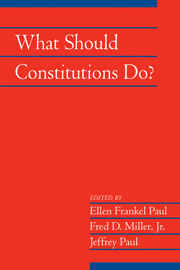Book contents
- Frontmatter
- Contents
- Introduction
- Acknowledgments
- Contributors
- What Are Constitutions, and What Should (and Can) They Do?
- Constitution and Fundamental Law: The Lesson of Classical Athens
- Contract, Covenant, Constitution
- Constitutionalism in the Age of Terror
- The Liberal Constitution and Foreign Affairs
- Do Constitutions Have a Point? Reflections on “Parchment Barriers” and Preambles
- The Origins of an Independent Judiciary in New York, 1621-1777
- Foot Voting, Political Ignorance, and Constitutional Design
- Pluralist Constitutionalism
- Deliberative Democracy and Constitutions
- The Constitution of Nondomination
- Can We Design an Optimal Constitution? Of Structural Ambiguity and Rights Clarity
- Index
The Origins of an Independent Judiciary in New York, 1621-1777
Published online by Cambridge University Press: 05 June 2012
- Frontmatter
- Contents
- Introduction
- Acknowledgments
- Contributors
- What Are Constitutions, and What Should (and Can) They Do?
- Constitution and Fundamental Law: The Lesson of Classical Athens
- Contract, Covenant, Constitution
- Constitutionalism in the Age of Terror
- The Liberal Constitution and Foreign Affairs
- Do Constitutions Have a Point? Reflections on “Parchment Barriers” and Preambles
- The Origins of an Independent Judiciary in New York, 1621-1777
- Foot Voting, Political Ignorance, and Constitutional Design
- Pluralist Constitutionalism
- Deliberative Democracy and Constitutions
- The Constitution of Nondomination
- Can We Design an Optimal Constitution? Of Structural Ambiguity and Rights Clarity
- Index
Summary
INTRODUCTION
An independent judiciary is an essential component of the American conception of separation of powers. Not surprisingly, the framers who drafted the judicial article of the U.S. Constitution during the summer of 1787 were influenced, both positively and negatively, by the state practices of the day: they embraced some practices and rejected others. The result was a federal judiciary that forms a separate branch of the national government, judges who enjoy tenure during good behavior, and salaries that cannot be diminished while in office. New York, among the most significant of the original thirteen states, was prominent on the question of judicial independence. This essay explores the constitutional development of the judicial branch in New York and assesses the influence of New York's judiciary on the federal constitution that followed. As will be seen, New York provides a vivid case study of a state “groping” toward a new ideal that became a reality a decade after its own constitution was enacted in 1777 and at a different level of government.
THE DUTCH PERIOD, 1621–1664
A. Charter of the Dutch West India Company of 1621
In 1609, Henry Hudson, an Englishman sailing under Dutch colors, was searching for the Northwest Passage to the Orient (now Asia). Instead, he found the river that bears his name. His discovery provided the Netherlands with a claim to territory–also claimed by England–that includes present-day New York, New Jersey, Delaware, and part of Connecticut. was called “New Netherland.”
- Type
- Chapter
- Information
- What Should Constitutions Do? , pp. 179 - 201Publisher: Cambridge University PressPrint publication year: 2011

